- Home
- Kevin Ashman
The Tomb Builders Page 6
The Tomb Builders Read online
Page 6
India accepted her hot drink and looked at Brandon. They had arrived at the hotel the night before and as she had no passport, he had booked one double room and then smuggled her upstairs when the receptionist wasn’t looking. Always the gentleman he had given her the bed while he slept on the sofa, an uncomfortable resting place for it was a full twelve inches shorter than him but despite her protestations, he would have it no other way.
‘Well,’ said India eventually, ‘you know the basics, I believe I may have found something that will rock the archaeological world.’
‘In that tomb back in the village?’
‘No, not that, Brandon, that was just one step upon a much longer journey. If I am right, this is far, far bigger.’
‘Okay, so, tell me what it is you have and we’ll go from there.’
‘Well,’ said India, ‘as you know I quit my job and decided to do something a bit more exciting but first I needed a holiday. For most of my life I fancied doing the Egyptian tour so thought, why the hell not? I have the money, I love history and there was nothing stopping me from going. Anyway, I booked the trip through a normal travel agent and decided to do some reading first so I was up to speed on the history. As you know, all my adult life I’ve worked in libraries so knew exactly what I wanted to read and where to get it.’
‘What do you mean?’
‘I didn’t want the usual tourist stuff, Brandon, that’s just regurgitated bullshit for the mass market. No, I wanted the other information, the sort of records that are not in the public eye for whatever reason. The controversial claims that are often made by academics on the verge of respectability but are discredited, just because their information doesn’t fit in with the mainstream way of thinking.’
‘Why would you want that?’
‘Oh, it’s a much better deal,’ said India, ‘not just in Egypt but in the historical records across the world. Governments are famous for it, Brandon, covering up the nonsense and pushing the accepted mantras. In itself that’s not a major problem as much of it is conspiracy theory crap but occasionally, amongst all the pointless chatter you find some nuggets of information. That’s what I wanted to read for while the guides spouted their well-rehearsed scripts for the masses, I could be imagining what it was really like all those years ago. That’s what history is all about, Brandon, getting under the skin of what the authorities don’t want you to know.’
‘Okay,’ said Brando, ‘so you started reading, then what?’
‘Well I had a few weeks on my hands,’ said India, ‘and immersed myself in all things Egyptian. What I found was fascinating and there is a whole different set of ideas and theories available when you look deep enough.’
‘Such as?’
‘Well, for instance, Egyptologists would have us believe that the pyramids are approximately five thousand years old but there is another school of thought that says they are at least twice that if not more.’
‘And you believe them?’
‘I’m not sure but it demonstrates my point. Anyway, I started to research a missing king of the fourth dynasty.’
‘I thought you said they knew who every king was?’
‘They do, at least they think they do. The thing is, the records say that Khufu inherited the throne of Egypt from his father Sneferu. That is the accepted timeline but I have found out the records also differ wildly as to how long he reigned. Some say about twenty six years while other say anything up to forty six years, nobody knows for sure. However, the thing is, there is also a record that says Khufu was the third of his dynasty to reign but if Sneferu was the first and he was the third, who was the second? There are no records at all showing an intermediate king between Sneferu and Khufu.’
‘So you set out to find him.’
‘I did.’
‘And?’
‘Nothing, not a sniff. What I did find however, was some obscure references to a man named Omari. Omari was a priest who was close to Khufu and apparently died shortly after the king. Usually a person so close to the king would be embraced into the funerary complex of his master and have a tomb resplendent in the sort of finery someone of high station could expect but something happened after Khufu’s death that meant he was cast from favour by the rest of the priests and he wandered out into the desert never to be seen again.’
‘And this caught your interest?’
‘It did, but not overly so, at least not until I came across his name again in Cairo.’
‘In what way?’
‘I was walking through the markets, dodging the usual peddlers of touristy crap when a boy approached with half a dozen trinkets for sale. Normally I would ignore people like that but this boy was different, he was polite, spoke good English and had a trustworthy face.’
‘So basically, you were taken in.’
‘I was,’ said India, ‘but I felt sorry for him. He looked hungry so I thought I would be a Good Samaritan, buy one of his false artefacts and send him on his way with enough money for a good meal.’
‘So what happened?’
‘I bought one of his trinkets and as he accepted the money, he said something that stopped me in my tracks.’
‘What did he say?’
‘May the blessings of Omari be with you all the days of your life.’
‘And?’
‘It was the same name that I had been researching only days earlier.’
‘I bet there are thousands of Egyptian deities called Omari.’
‘Not that I know of but anyway, it raised my interest enough to ask him whose blessings he was invoking. What he had to say took my breath away for he said it was the wronged one, the high priest of Salhuk.’
‘And who was he?’
‘Salhuk is another name for Khufu favoured by the older families of Egypt. Not many people know that but its use by the boy meant he came from a long line of traditionalists rather than the modern day peddlers who scam tourists for a living.’
‘So what did you do?’
‘I bought him a coke and we sat on a grassy bank and talked.’
‘About what?’
‘Anything and everything really. His family, his home, that sort of thing but when I asked about Omari, he opened his shirt and showed me a pendant. The necklace was leather but the pendant itself was green copper and engraved with the faint image of a man. He told me it was the image of his protector, Omari and though I offered him a lot of money, he refused to part with it.’
‘Do you think it was real?’
‘Of course. If it was fake he would have sold it like a shot. Anyway, the thing is we got on like a house on fire and during the conversation, he told me his father had dug up the pendant when he was a boy and when he died he left it to his son.’
‘And you concluded that if there was a pendant with Omari’s image on it, then there may be other things.’
‘Sort of, but I’m not stupid. That pendant could have been dropped anytime in the past five thousand years by all sorts of people.’
‘Exactly.’
‘Anyway, after the boy left I did some on-line research and what he had told me all added up. His home village, a place called Nazra-El-Bedhel, did indeed pay homage to Omari and though that in itself was unusual, I found a recent article where a well-known Egyptologist accused the authorities there of selling unrecorded artefacts on the black market. The charges were thrown out but when I put it all together, I thought there was enough evidence to warrant a trip.’
‘You went to Nazra-El-Bedhel?’
‘I did and within days I knew there was something going on. I stayed at a local inn on the pretence of writing a book but soon realised there was an illegal dig being carried out less than a mile away.’
‘How did you know?’
‘Brandon, I was a westerner in a rural village. Not a day went by without me being offered some artefact or another. Most were tat but many seemed genuine and some were linked with Omari.’
‘So what did you do?’
‘At
first I asked if I could have access to the site but was told firmly no. Well you know me, I don’t like taking no for an answer, so that afternoon I went up to the site anyway. ‘
‘And they just let you in?’
‘There was nobody there. The site was deserted. Apparently there was a local festival going on and I suppose they thought there was no need for guards as they were so isolated. Anyway, the place was empty so I took the opportunity to explore.’
‘What did you find?’
‘I found a tomb,’ said India, ‘the burial place of Omari himself.’
‘Really?’
‘Yup.’
‘What was it like?’
‘Well, within the boundaries of the dig site there was an old hut that has obviously only been there a few hundred years or so but at the back the workers had sunk a shaft and broken through the roof of a funerary chamber. I climbed down the ladder but couldn’t see anything, it was so dark.’
‘Did you light some bulrushes or something?’
‘No Brandon,’ sighed India, ‘I turned on the electric lights.’
‘There’s electricity down there?’
‘Of course there is,’ said India, ‘these people are not savages, Brandon, they had it wired up to a generator. Anyway, as soon as the lights came on I knew I was in the right place for right in the middle of the tomb was a sarcophagus.’
‘Was Omari’s mummy in there?’
‘No, it had long gone, probably stolen thousands of years ago along with any funerary valuables.’
‘No treasure then?’
‘Not in the sense you are thinking of.’
‘What other sense is there?’
‘Brandon, the tomb reliefs are mostly intact. Drawings of how life really was at the time, images of gods, depictions of routine tasks, you name it, it was there.’
Brandon shrugged his shoulders.
‘Doesn’t mean anything to me.’
‘Perhaps not but Egyptologists would kill to see reliefs of that quality,’ said India, ‘but as it is an illegal dig, the tomb will probably never be recorded or seen by the authorities.’
‘What did you do?’
‘I took photographs,’ said India, ‘dozens of them on my phone.’
‘And you intend to tell the authorities?’
‘I did,’ said India, ‘but just before I left, I saw an ante chamber half full of sifted rubble. Out of curiosity I had a look inside and though there were some poorer reliefs still on the walls, they were nowhere near the quality of the main room. I took some pictures anyway but as I did, the flash reflected off something in the corner.’
‘What?’
‘An old piece of packing case, or at least that what I thought it was. It turned out it was part of a wooden relief that must have once covered part of the antechamber. Most has gone now, probably used as fuel for the fires of the villagers but the more I looked, the more the inscriptions seemed familiar.’
‘Why?’
‘At first it looked like nothing important, just some scratches in an old piece of wood but I knew I had seen something similar before. As hard as I tried I couldn’t make it out but realising I was in a forbidden area, I put it under my jacket and left the tomb.’
‘You robbed the tomb.’
‘I suppose I did.’
‘There’s no suppose about it, India, you stole from an Egyptian grave.’
‘Okay,’ said India, ‘but what’s done is done. The thing is, on the way back down, Muburak’s men saw me and found the piece of wood under my jacket. They confiscated it, took my passport and the rest, as they say, is history.’
‘So,’ said Brandon after she took another sip from her coffee, ‘I suppose you are hoping the pictures on your camera will tell you something more about the tomb?’
‘More than that, Brandon, the engraving may have been taken by Muburak but with a bit of luck, I’ll still have the image on my phone.’
‘What do you think it is?’
‘I’m not sure,’ said India, ‘but my instinct is telling me it is of utmost importance.’
‘Well,’ said Brandon as the computer beeped, signalling the upload was complete, ‘it seems we are about to find out.’ They turned to face the screen and as they both reached for the mouse pad, India’s hand touched Brandon’s momentarily.
‘Sorry,’ they both said at the same time, pulling away their hands.
‘Please, go ahead,’ said Brandon eventually, ‘they’re your pictures.’
India leaned forward again, eager to see what she had captured on the phone’s camera yet painfully aware she was blushing furiously.
‘Here goes nothing,’ she said and clicked on the first picture.
----
Chapter Eight
Ramesses Hotel
2014
‘Wow, they are quite something,’ said Brandon, looking at the pictures on the screen.
‘They are,’ said India, ‘especially considering most of the reliefs across Egypt have lost their original colour. These seem to have lasted the test of time and though they are faded, the detail is incredible.’
‘What’s that one?’ asked Brandon pointing at an image.
‘The god, Sobek,’ said India, ‘part man, part crocodile. God of the Nile and the army, amongst other things.’
‘And that one?’
‘Osiris, god of the afterlife.’
India scrolled through the pictures, answering Brandon’s questions as she went.
‘They seem to tell a story,’ said Brandon, ‘the first pictures show people using tools amongst the rocks but these last few seem to show a half built pyramid.’
‘I know,’ said India, ‘and that’s what is so exciting. There are no records of how the pyramids were actually built so if there were to be any depictions of that sort of thing, the importance would be life changing.’
‘Did you see any?’
‘Not while I was in there but don’t forget, I was there for minutes only. This priest was obviously around at the time of the construction and with a bit of luck, further in the tomb there may be records about the methods employed.’
‘What about the diagram on the wood?’
‘I’m coming to that,’ said India, ‘it was the last one I took.’
Finally the grainy picture of a piece of timber appeared but was indistinct.
‘Crap,’ said India, ‘it’s a poor picture.’
‘Even so,’ said Brandon leaning forward, ‘it still only seems like a few scratched lines.’
India sat back, disappointment written all over her face.
‘Let me see what I can do,’ said Brandon and for several minutes, worked on the laptop to make the image crisper but when it was done, they were still disappointed at the quality.
‘Make any sense to you?’ asked Brandon.
India bit her lip and shook her head.
‘I’m not sure,’ she said, ‘there’s something about the arrangement but I can’t quite get it. If I had the original plank, then it may just come.’
‘Well that’s not going to happen,’ said Brandon. ‘Anyway, I’m going to get my shower. After that, we’ll get you some new clothes and see about you getting a replacement passport.’ He disappeared into the bathroom and shut the door.
India continued to stare at the grainy image on the laptop, turning it over and over in her mind. She was about to close the lid when suddenly her eyes opened wide as realisation dawned. She reached over and typed quickly, rotating the image on the screen until she could see it for what it was.
‘Oh my god,’ said India and unplugging the laptop, walked quickly toward the door.
‘Brandon,’ she called as she passed the bathroom, ‘I’m just nipping out. There’s something I need to do, I’ll be back as soon as I can.’
‘Don’t leave the hotel,’ he shouted above the noise of the shower.
For a moment India considered trying the handle of the bathroom door, just to see if he had locked it, but thought be
tter of it.
‘No problem,’ she shouted, ‘see you soon.’
----
An hour later Brandon was staring out across the Cairo skyline as India came back into the room.
‘There you are,’ he said, ‘I was getting worried.’
‘Brandon,’ gasped India, ‘you have got to see this.’
‘Where have you been?’ he asked.
‘Down to reception, I needed to print something out.’
‘Didn’t they ask you any awkward questions, like, who are you for instance?’
‘The receptionist was different from last night,’ said India, ‘so was none the wiser. Anyway, I printed out the pictures from your laptop and I want you to look at two of them in particular.’ She placed two sheets of paper side by side on the table. ‘What do you think of those?’
Brandon stared at the diagrams on each. Both were more or less the same size and were obviously the outlines of a pyramid. Inside each triangle were a set of lines drawn at varying angles, connecting what seemed to be small boxes. Although they were both essentially the same, one was printed while the other had been overdrawn in ink.
‘What about them?’ asked Brandon.
‘Brandon, you really have to take an evening class or something, all that time in the army has clouded your mind.’
‘I know a lot of things, India but history is not my strong point. Now, why don’t you explain what I am looking at?’
India sighed and grabbed one of the pictures.
‘This is a pen outline of our diagram engraved on the wooden tablet,’ said India, pointing at the first sheet, ‘it was a poor print out so I have inked over the lines for clarity. She picked up the second diagram. ‘This one is the same picture but I found it on the internet. Basically they are the same thing, both diagrams of the inside of the Khufu pyramid but one is up to date while the other is five thousand years old.’
‘Okay, with you so far,’ said Brandon scanning the two images.
‘The narrow parallel lines are tunnels,’ continued India, ‘and the squares are chambers inside the pyramid itself.’ She pointed out the main features as she talked. ‘This is the main access tunnel leading down into the heart of the structure from the entrance and is called the descending passage. As you can see, it branches off quite early on and ascends toward the main room in the centre of the pyramid, the king’s chamber. That branch is called the ascending passage.’

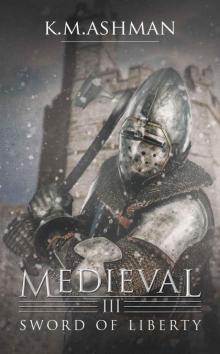 Medieval III - Sword of Liberty
Medieval III - Sword of Liberty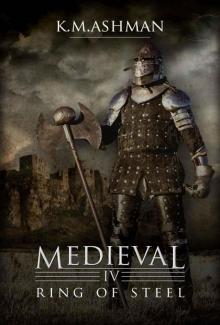 Medieval IV - Ring of Steel
Medieval IV - Ring of Steel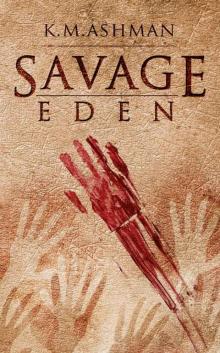 Savage Eden
Savage Eden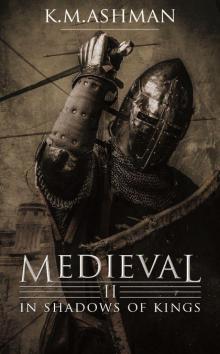 Medieval II - In Shadows of Kings
Medieval II - In Shadows of Kings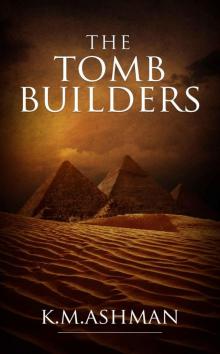 The Tomb Builders
The Tomb Builders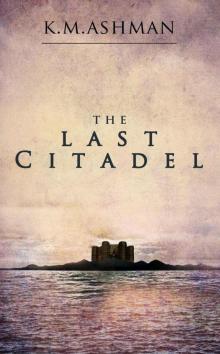 The Last Citadel
The Last Citadel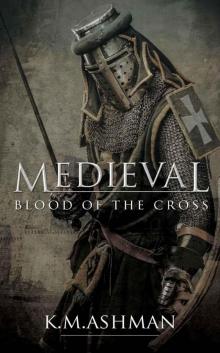 Medieval - Blood of the Cross
Medieval - Blood of the Cross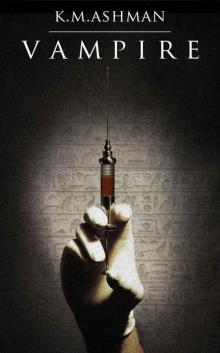 Vampire
Vampire Roman
Roman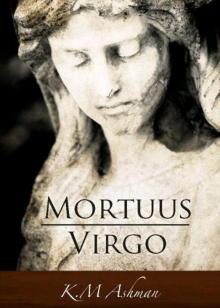 Mortuus Virgo
Mortuus Virgo